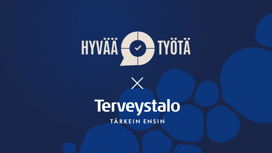How to make working life humanly efficient and sustainable?
What should workplaces do differently to make employees more productive? The pace of work is getting faster and faster, but is it still sensible and sustainable to work at such a fast pace? How can we build a working life that supports people's well-being in a sustainable way? Answers to all these questions are being sought in a year-long project launched by Terveystalo's Organisational Psychology team, which will examine the state of Finnish working life from the perspectives of human and organisational well-being, human efficiency and sustainability.
The project involves 9 customer organisations from different business sectors. Each of them has a research topic and development need for their own organisation that they want to address through the project. They all share the common goal of making Finnish working life more humanly efficient and sustainable. One where both people and business thrive.
– Statistics on sickness absence and disability related to mental well-being are at an alarmingly high level. The younger generation, who should take responsibility for running our economy in the future, are tiring out before they have even really got into the workforce. If we want to ensure the success of Finnish organisations in a competitive market, we cannot afford a situation where the pace and ways of working are not humanly sustainable," says Jaakko Sahimaa, an organisational psychologist at Terveystalo, who is leading the project.
At the end of the programme, the findings and observations of the expedition will be published in an open access publication for wider use by Finnish organisations. The year's findings will also be presented in an open webinar series on human effectiveness produced by Terveystalo's organisational psychology team.
Has working life become too performance-oriented?
According to the European Agency for Safety and Health at Work, work intensification and acceleration have been the most significant changes in working life since the 1980s. This change is challenging people's well-being and the performance of organisations. The cognitive load of work has grown to the limits of human endurance and has brought the issue of job satisfaction and, in particular, psychosocial workload, into the spotlight in recent years.
– In the industrial manufacturing plant, it has been logical to tune machines to the extreme in order to make work more efficient, but in human-centred brain work, it is not by tightening the screw that we get human and sustainable efficiency, but by completely different mechanisms - by creating a functional working environment through good management and by taking people's human needs into account. Just as mechanical equipment needs maintenance and protection to prevent overheating, so do people," says Jaakko Sahimaa.
– Ultimately, we are in the business of achieving certain goals, so we cannot become too allergic to efficiency and performance. However, we cannot push efficiency demands to extremes by making it the norm to stretch and push ourselves to the limit," Sahimaa continues.
The project will explore and promote human efficiency with the partner organisations involved. With Terveystalo's organisational psychologists, the organisations will have a unique opportunity to develop their own operations in an insightful way, but also to learn best practices in promoting human effectiveness from other participating organisations. The project already includes Scania, Kempower, Nordea Life, City of Oulu, Tapaus, SOS Lapsikylä, Unicef, KEVA and Biisoni.
– There is still room for a few more organisations, so if a research trip could be useful, for example to develop pre-employment and leadership, improve well-being and employee experience, or make organisational culture more humanly effective, there is still time," Sahimaa encourages.





